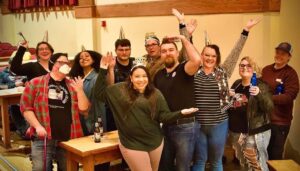
In early 2022 a group of queer community members and allies decided to hold a Pride celebration at Breaks Interstate Park in rural Appalachia, on the Virginia-Kentucky border. The event was to be less of a parade and more of a rural family reunion style pride celebration, an expression of queer rural values of community and mutual aid. The space offered connections to resources to help people meet their basic needs like food, housing, and health care. They billed the space as Happalachian Social Club. It went about as well as one should expect it to.
It was a smashing success. Over 100 people showed up to the first annual Pride in the Park in Clintwood, VA, enough to overflow the space and necessitate a larger venue for 2023. The event demonstrated that queer folx not only exist in Appalachia, but want community, connection, and visibility. And it showed that there is broader support from their neighbors than one would assume based on stereotypes of Appalachia.
The organizers had touched on an unmet need with tremendous potential and pent-up support. Because they wanted to grow their work, they needed more structure to hold it, so they reached out to Virginia Organizing and became a joint plan of work partner in advance of their 2023 event. Rebranding as Patchwork Kinfolx, the organization has established itself as a queer arts collective dedicated to cultural organizing. They seek to use the arts to forge and cement ties in the community, and to provide a space of belonging for marginalized community members.
They are addressing cultural challenges that are common to the region: a sense of hopelessness linked to a poor economy, declining population, and the grief of losses during the COVID-19 pandemic. Many people suffer from despair. Patchwork Kinfolx is igniting a sense of hope through joyful community-building that invites as many people as possible into the work, regardless of background.
Pierceton Hobbs, one of the founders of the group, grew up in the coalfields of Virginia, and started the work in part to meet his own need for support and connection.
“I was a hollar kid in a white community,” he says. “My parents divorced and my mother remarried when I was a tween. My stepdad was Black, and I started going to an AME Zion church in Norton, VA.”
His experience in a Black community helped give him an understanding of how histories of racism, classism, gender violence, and homophobia come together to impact his community. It is foundational to how Patchwork sees its work. But growing up queer in Appalachia meant facing incredible trauma.
“I was couch surfing at 17-years old. I was a ‘lost cause’ for three years.”
When Pierceton saw other young people like him going through the same things, he woke up. “I got into community organizing, learned queer history and activism; I learned environmental and cultural history, and I got a job at Appalshop that tied all those things together.” It was during that tough time of his life that the seeds of Patchwork Kinfolx were sown.
The work started with mutual aid – directly-affected people coming together to meet each other’s needs – and evolved when it became clear that people needed a “third place” beyond the workplace or home where they could find community. Patchwork Kinfolx is a collective, meaning that they make all decisions by consensus and assign roles on a case-by-case basis according to the needs of each project they adopt. They move slowly, wanting to avoid goal-oriented grind culture that could burn people out. The goal is in the process: be fun, be supportive, let people come to the work on their own terms. Projects themselves include the core work of using artistic expression to connect and educate their community, but they have distinct working groups for each project or task: planning for the Pride event, fundraising, a “dream team” for envisioning new projects, and mutual aid.
While their work is local, anyone can support their cultural work by becoming a member for a $12 monthly fee. Members get access to exclusive blog and artistic content for purchase.
Patchwork Kinfolx is demonstrating how effective organizing in Appalachia is different from more visible work that takes place in urban areas. For many of us, when we imagine how to celebrate Pride, we think of a parade. In the hollars of Appalachia, it is a picnic. In order to be successful, a picnic needs everyone to show up and contribute what they have. That means everyone has a stake in how tasty the meal is. There are no spectators to a picnic. Everyone has something to offer, everyone has something to gain, everyone depends on each other. That is something we can all learn from.




